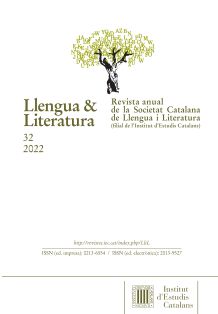Bare plural nominals in the object position: A comparative study of Catalan and Russian
Article Sidebar

Main Article Content
Daria Seres
Universitat Autònoma de Barcelona
The goal of this article is to analyse the distribution and possible interpretations that plural bare nominals may have in object position in Catalan as a language with articles. I then compare them with the distribution and possible interpretations of bare nominals in Russian, as a language without articles, thus contributingto a better cross-linguistic understanding of this phenomenon. I suggest that in Catalan, the restrictions on bare plural nominals appearing in the internal argument position may depend on the degree of agentivity of the verb. I propose that the interpretation of bare nominals is related to the type of sentence in which they appear: non-characterising (episodic or habitual) or characterising. In the former, bare plural nominals have an existential interpretation, while in the latter they are non-referential, similar to pseudo-incorporated nominals. In Russian, in turn, the distribution of bare nominals is not restricted. Furthermore, their interpretations are the same as in Catalan, and they depend on the same factors, although bare nominals in Russian may also may a definite and a generic interpretation, which depends on the discursive context and the type of verbs that select them as objects.
Article Details
How to Cite
Seres, Daria. “Bare plural nominals in the object position: A comparative study of Catalan and Russian”. Llengua i literatura, no. 32, pp. 71-96, https://raco.cat/index.php/LlenguaLiteratura/article/view/399449.
Author Biography